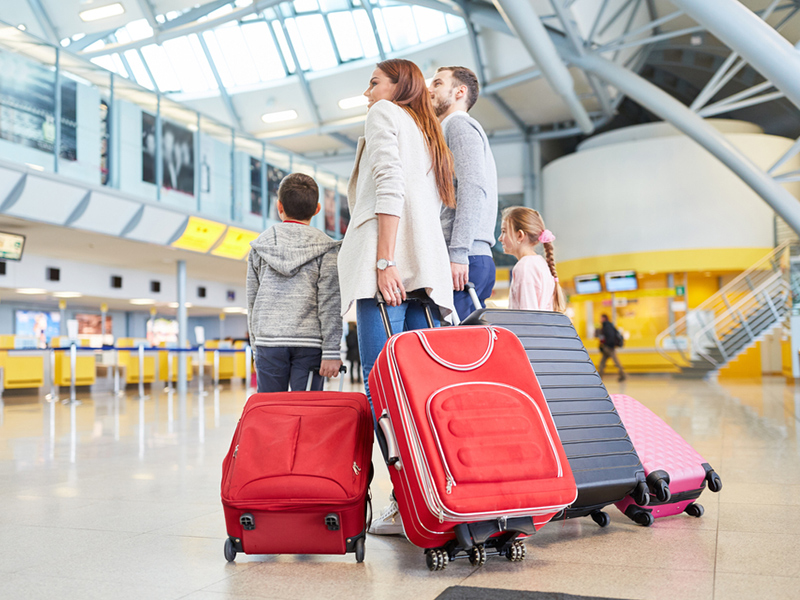Excess baggage at the airport is one of the common issues in air travel. In such situations, individuals are forced to pay additional fees on top of their ticket expenses, flight charges, etc., to transport all their baggage. However, sometimes this happens when a person is not prepared to pay the extra fees or doesn’t have enough money to cover the excess baggage. In such cases, alternative methods need to be employed to solve this problem. In this article, Eligasht provides important tips to prevent excess baggage at the airport. Stay with us.
Book Iran Air flights from London to Tehran and Tehran to London with Eligasht UK:
What does excess baggage at the airport mean?
If you have experienced air travel, you surely know that one of the steps before boarding the airplane is handing over your baggage for labeling and transfer to the aircraft’s cargo section. At this stage, the weight of your baggage, whatever it may be, whether a simple suitcase or a large package, is measured, and its permissibility is calculated based on your ticket type.
In such situations, there are two scenarios: either your baggage is within the allowed limit specified on your ticket, and it can be loaded into the cargo section without any issues, or you exceed the weight limit and incur excess baggage charges. In the latter case, you must first pay the baggage fee for it to be loaded. With these explanations, excess baggage at the airport can be understood as each passenger being able to carry a certain weight of baggage based on their ticket, and if their baggage exceeds this limit, it is considered excess baggage, requiring payment according to the airline’s conditions.
The difference between main baggage and hand luggage
Before delving further into the topic of how to prevent excess baggage at the airport, it is essential to understand the differences between various types of baggage in air travel. When traveling by plane, each passenger has two types of baggage. One type is hand luggage, such as a purse, bag, or backpack, which the passenger carries with them into the airplane cabin. It usually contains essential and valuable items, such as phones and laptops. The use of these hand luggage items is easily accessible to passengers when needed, and their place is the cabin located above the passenger seats.
The other type is main baggage, mostly in the form of a suitcase, which is placed in the aircraft’s cargo compartment. This type of baggage needs to be handed over to the baggage section before boarding the plane, where it is weighed, labeled, and sent to the cargo area. In the main baggage, any type of item can be included except for prohibited items such as sharp objects, tobacco products, and flammable items.
Related post
Baggage Allowance & Extra Baggage – A Guide
Iran Flights Baggage Allowance
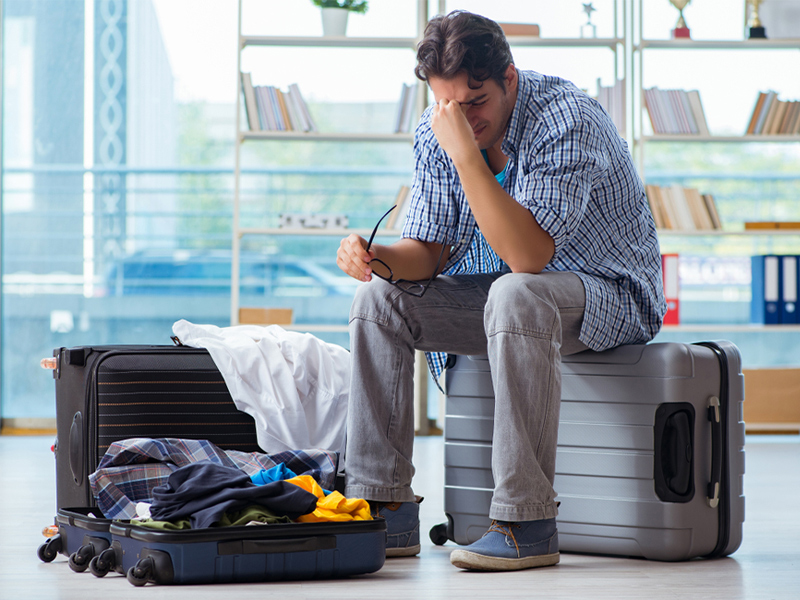
Key factors in determining excess baggage fees
If your baggage exceeds the airline’s allowed weight limit, you are required to pay the fees associated with it; otherwise, you won’t be able to transport the excess baggage. The cost of excess baggage is a concern for all travelers and is determined by various factors such as ticket price, flight duration, flight class, dimensions of the suitcase, baggage form, destination, weight, and quantity of baggage.
What is the allowed excess baggage limit on domestic airlines?
One of the important factors in determining excess baggage at the airport is the type of airline. Different airlines have different limits for the allowed baggage based on factors such as the size of the cargo compartment, the number of passengers on each flight, and more. Considering this information helps in choosing the appropriate airline and reduces concerns about the cost of excess baggage. These regulations vary between domestic and international airlines. The below information is specific to Iran’s Airlines.
Excess baggage on Economy flights
The allowed baggage limit on Economy flights is the same for all domestic airlines and is 25 kilograms. However, on certain flights under specific conditions, it may be allowed up to 30 kilograms.
Excess baggage on Business or First Class flights
In Business or First Class flights, which offer higher flight classes and more services to passengers, the amount of baggage that a passenger can carry without paying an additional fee is higher. In domestic Business Class flights, different airlines have a limit of 40 kilograms, and for first-class flights, it is 50 kilograms, and in some cases, it may be higher. The exact allowed baggage limit is specified on the ticket of each domestic airline.
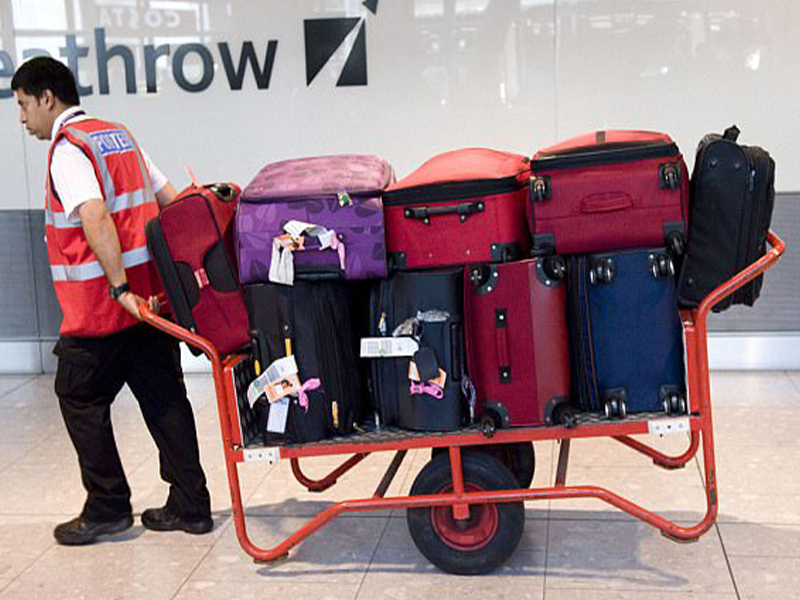
Allowed Hand Baggage Limit
In different flights, there is also a specific limit for carrying hand baggage, and if the baggage exceeds the limit, the passenger must either pay for the excess baggage or transfer part of the baggage to their checked luggage. The maximum allowed hand baggage limit on domestic Economy flights is typically 5 kilograms, and the maximum allowed hand baggage limit on domestic Business flights is usually up to 7 kilograms.
What is the maximum allowed excess baggage at the airport for international airlines?
Regarding international airlines, similar to domestic flights, there is a specific maximum allowed baggage limit, and passengers have to pay for excess baggage if they exceed it. Most international airlines consider a limit of 30 kilograms for Economy flights for passengers, but depending on the country and the airline, this limit can reach up to 40 kilograms on some airlines. However, carrying this amount of baggage is conditional on dividing it into two suitcases. Baggage regulations not only apply to the weight of the package and suitcase but also to their dimensions. For example, in Qatar Airways flights, the allowed baggage limit for Economy, Business, and First Class flights is 30, 40, and 50 kilograms respectively, provided that the length, width, and height of the package do not exceed 158 centimeters.
However, in some European or Asian airlines, the allowed baggage limit may be less than 30 kilograms. For example, in Turkish Airlines, the allowed baggage limit for Economy flights is 20 kilograms, and for Business flights, it is 30 kilograms, and any weight exceeding these limits will require the passenger to pay an additional fee. In Lufthansa flights, passengers in Economy class are only allowed to carry 23 kilograms of baggage in one suitcase, and in Business class, that amount is divided into two suitcases and reaches 32 kilograms.
The excess baggage cost at the airport for domestic and international airlines varies depending on the airline and the specific circumstances. In most cases, the cost of excess baggage is calculated based on the ticket price, and if a passenger exceeds the allowed baggage limit, they will be charged a fee at the airport. However, some airlines may not include the baggage cost on the ticket and instead collect the entire cost, both for the allowed baggage and the excess baggage, at the airport.
For domestic flights, the excess baggage cost is typically calculated as a percentage of the ticket price for each additional kilogram of baggage. It is common for passengers to pay 1% of the ticket price as a penalty for each kilogram of excess baggage. However, for international airlines, the costs may vary based on the regulations of the specific country, the type of baggage, the destination, and other factors. For example, on flights from Iran to Qatar with Qatar Airways, the excess baggage cost is $20 per kilogram. But for Iran to Southeast Asian countries, the same airline may charge $30 per kilogram of excess baggage. It is advisable to inquire about the costs from travel agencies or the airline when purchasing tickets.
Preventing Excess Baggage at the Airport
As mentioned earlier, to avoid excess baggage, it is necessary to pay the corresponding fees. However, there are situations where it may not be feasible. For example, in international travel, the acceptable currency of that country may not be available, and cash for currency exchange may have run out. Similarly, in domestic flights, access to cash or bank cards may not be possible at that moment.
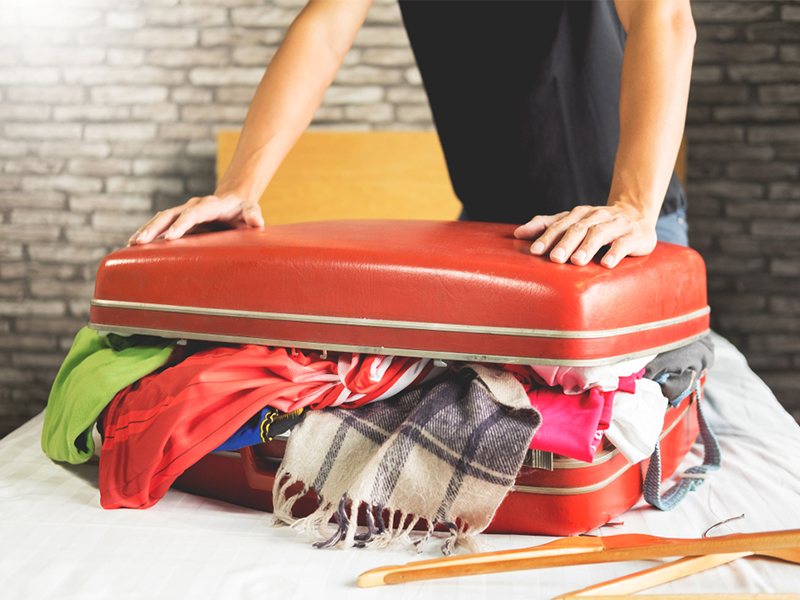
Even in certain situations, a person may not have the possibility to pay an additional fee for extra baggage due to the high cost of tickets. In such cases, the following solutions can be helpful. However, keep in mind that by calculating the amount of baggage before the flight and familiarizing yourself with the allowed baggage regulations of each airline before packing and preparing the baggage, you can largely prevent the problem of excess baggage.
1. Dividing the baggage among companions
If you have handed over your suitcases for weighing and received an excess baggage alert, don’t worry. In these situations, you can use your companions who have less baggage to divide the load. In this case, your suitcase will be calculated along with the ticket of the accompanying person, and you will not incur any excess baggage charges.
2. Preventing excess baggage at the airport
If you have made a lot of purchases during your trip and are confident that you will have excess baggage, it is better to transport the baggage to your destination using another method. For example, postal companies are a suitable option for domestic cargo transportation. The cost of sending cargo through postal companies is sometimes much lower than carrying it with you on an airplane, and the safety of transporting the goods is higher. However, since the process of sending cargo through postal companies takes more time, it is better to send your excess baggage to the destination a few days in advance, based on their scheduling table.
3. Dividing the baggage between the carry-on bag and the suitcase
As mentioned before, each passenger is allowed to carry a certain amount of baggage with specific conditions inside the aircraft cabin, in addition to the baggage checked and packed in suitcases. If your excess baggage is around 2-3 kilograms and you do not have many items to carry inside the plane, it is better to place that extra amount in your carry-on bag so that it reduces the weight of the suitcase, solving the problem of excess baggage.
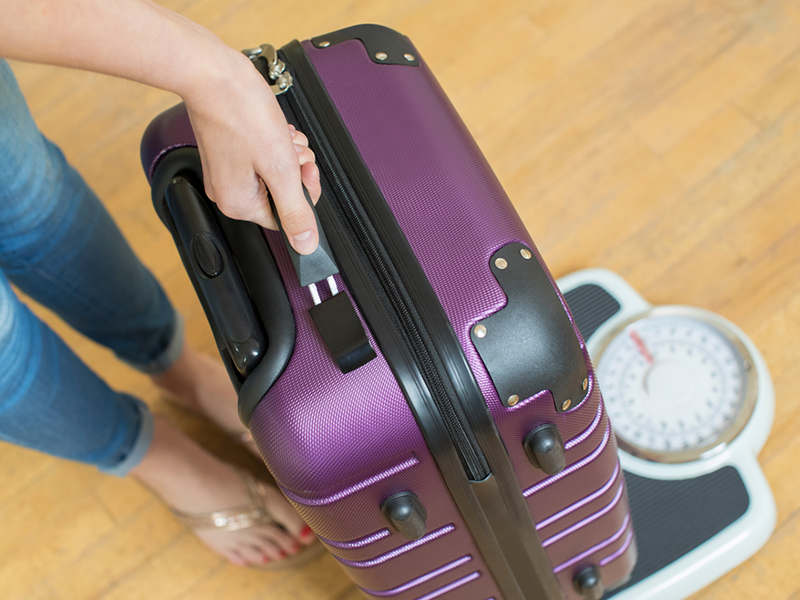
Conclusion
Excess baggage at the airport is one of the occurrences that air travelers should be prepared for in any situation. This problem is often resolved by paying a fee, but there are also ways to solve this problem without any cost. For example, familiarizing yourself with the baggage regulations and allowed limits of each airline and more. In this article, Eligasht has provided a complete explanation of these solutions. By reading other articles on our website, you can become familiar with more tips that help make air travel hassle-free.
Frequently Asked Questions
1- How do domestic airlines differ in the allowed excess baggage limit at the airport?
Domestic airlines do not differ in the allowed baggage limit, and this distinction only applies to different flight classes. In all airlines, the maximum allowable baggage for economy class is 25 kilograms, and for business class, it is 30 kilograms.
2- What is the maximum excess baggage limit for international airlines at the airport?
The amount of excess baggage varies among different airlines. For example, Qatar Airways allows the transportation of 30 kilograms of baggage in the economy class without any additional charges, while Turkish Airlines only allows 20 kilograms of baggage in the economy class without any extra fee. It is better to check the ticket of the desired airline for accurate information on the allowed baggage limit.
3- How is the cost of excess baggage calculated on domestic flights?
The cost of excess baggage depends on the weight of the extra baggage and is calculated as one percent of the ticket price per kilogram for all flights.
